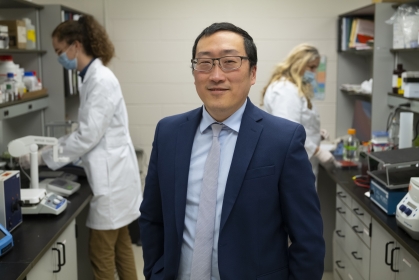
A Publication for Alumni & Friends of Rutgers Robert Wood Johnson Medical School

William T. Hu, MD, PhD, Studies the Underlying Causes of Alzheimer’s Disease to Identify New Treatment

Americans are living longer. Data from the Alzheimer’s Association’s Alzheimer’s Disease Facts and Figures 2020 report show that the population of Americans 65 and older is projected to grow from 56 million in 2020 to 88 million by 2050. Researchers have found an increase in memory and neurodegenerative disease associated with this aging population, with nearly 6 million Americans living with Alzheimer’s Disease (AD). According to the report, AD has become the sixth leading cause of death in the United States, with one in three aging Americans living with the disease. Medical professionals are fearful that they will be unable to meet this demand for care.
As both a clinician and researcher, William T. Hu, MD, PhD, FAAN, new chief of the Division of Cognitive Neurology at Rutgers Robert Wood Johnson Medical School, the Institute for Health, Health Care and Aging Research, and Rutgers Biomedical and Health Sciences, has spent his career seeking to improve the outcomes of aging Americans affected by detrimental diseases like AD and related aging diseases. Dr. Hu’s research focuses on identifying biomarkers that can help diagnose disease early and on the development of effective treatments.
Importance of Early Detection
Research has shown that early detection and diagnosis of Alzheimer’s Disease has improved outcomes for patients. Explains Dr. Hu, who came to Robert Wood Johnson Medical School as an associate professor in 2020 after 11 years at Emory University and the Emory Alzheimer’s Disease Research Center, “We want to start treatments before the brain has deteriorated—it’s hard to reverse something which has already happened. As the disease progresses, it also is more difficult to treat the multiple brain regions and processes afflicted.” Dr. Hu notes that if the disease is diagnosed early, certain exercises, social activities, and non-drug-related treatments have been proven to improve overall brain health for people with AD.
Early signs of AD can include memory loss, difficulties finding the right words during conversations, or getting lost while driving.
“We encourage all older adults to talk to their doctor when they’re having memory issues. Too many people attribute memory loss to a normal part of aging and do not seek help. We have to get over this stigma,” says Dr. Hu.
Another approach to early diagnosis is population screening. Medicare has begun this process through an annual wellness visit where physicians check their patients’ cognitive ability and compare it to their previous years’ performance.
Because Dr. Hu stresses that best outcomes for people with dementia occur in early diagnosis, his research focuses on understanding the early changes in neurodegenerative diseases to help identify the disease through biomarkers.
Identifying Biomarkers through Research Grants
Dr. Hu explains that until fairly recently, the only way to confirm if someone had AD was through a postmortem examination of their brain. Advances in biomarkers, such as those in the cerebrospinal fluid (CSF), have dramatically changed that over the past 10 years.
Biomarkers are objective measures or tests that pinpoint underlying disease processes. According to Dr. Hu, truly effective treatments for people with AD do not yet exist because currently used biomarkers only address limited aspects of the disease—even if they are very good for diagnostic purposes. Dr. Hu is working on three National Institutes of Health (NIH) grants that seek to discover biomarkers, explore how and why they change, and translate these biomarkers to treatments for patients with AD.
The first of Dr. Hu’s grants is focused on understanding the impact of inflammatory proteins in the spinal fluid. Historically, inflammation was thought to accelerate AD, but Dr. Hu’s research has found inflammatory changes in the brain to have both protective and harmful effects. A better understanding of inflammation’s impact on AD progression could expand the drug cocktail for AD by introducing therapies proven to work with other autoimmune diseases.

A second grant studies why women are more at risk for Alzheimer’s Disease.
“Women make up two-thirds of people with AD, but there hasn’t been definitive research as to why,” says Dr. Hu. “What we do know is that women undergo significant hormonal changes during menopause. Our study will look examine this critical period to determine if there is something that triggers AD.”
Dr. Hu describes that while continued use of hormone therapy for many years following menopause increases AD risks, epidemiological studies seem to suggest hormone therapies protect women from AD right after menopause. Past research has shown sleep disruption to increase AD risks, and Dr. Hu hypothesizes that the sleep disruption common during menopause may be the link.
Dr. Hu’s study will monitor the sleep of a cohort of women while tracking spinal fluid levels of AD biomarkers to analyze how they change over three to five years. The research team hopes to discover why hormone replacement therapy in early menopause is protective, but not prolonged.
“This is the first opportunity where we are testing these clinical observations using mechanistic biomarkers beyond an association—a true advantage of being a clinician and a researcher,” says Dr. Hu. The team predicts that women who are on hormonal therapy will have less sleep disruption, less spinal fluid inflammation, and less accumulation of AD biomarkers.
The third NIH grant Dr. Hu is pursuing studies familial frontotemporal dementia (FTD). Prior research has discovered a number of genetic mutations for FTD, which enables clinicians to find out which other family members may be at risk. Dr. Hu’s study will measure the spinal fluid inflammatory proteins in people with different mutations to see if some mutations result in harmful versions of the protein that may solicit a different inflammatory response.
Explains Dr. Hu, “Our study might prove that typical treatment for people with these familial FTD, which is to engage the normal DNA copy, could also increase the abnormal protein to enhance toxicity.”
Different Diagnoses for Black and White Americans
In 2011, Dr. Hu and his team at Emory began a study that sought to answer a research question in response to a clinical observation. When using spinal fluid to try to diagnose AD, the research team had observed that Black and white Americans had different levels of tau-related proteins. Their research showed that these and other key AD proteins had lower levels in Blacks than whites when both populations were affected by the disease. This led to a national conversation about how AD research is conducted.
“We proved that you cannot assume biomarker profiles developed in whites to be directly applied to other populations. If clinicians use the same diagnostic thresholds, we would miss 30 percent of AD in the Black community. A personalized approach to medicine using biomarkers has a huge impact for AD treatment and health equity.”
Clinical Implications from Research
According to Dr. Hu, drug development for AD has been incredibly slow, with only three approved drugs that are not very effective. None of these treatments targets the disease processes that lead to AD.
Dr. Hu explains that every modern biomarker for an AD disease process is a potential target for drug therapy. This concept is the ultimate purpose of his research and has generated great enthusiasm and hope in recent clinical trials. He says, “The goal is to enroll people most likely to benefit from one therapy into that clinical trial.”
Dr. Hu emphasizes that every person’s AD course is unique, and this is often reflected in their brain and spinal fluid. For example, some people show increased activity by a special macrophage of the brain in their spinal fluid, and this is associated with slower clinical decline. “If we can better match medications with a person’s specific form of AD in the future, we will be able to achieve a much better prognosis for each patient,” he says.
Another benefit of Dr. Hu’s research for people living with AD is that medications could be repurposed from other diseases with shared mechanisms. Drugs for autoimmune disorders such as rheumatoid arthritis and multiple sclerosis are already available and are successful. This opens up additional treatment opportunities for AD.
He continues, “To treat a complex disease like AD, we as researchers and clinicians cannot only focus on a single battlefront. We likely need to take a multipronged approach—like in guerilla warfare—to be successful.”
Plans for the Division of Cognitive Neurology
Dr. Hu and his team plan to start an Alzheimer’s Disease Center at Rutgers with a modern diagnostic clinic that is dementia inclusive and friendly—embodying the national movement to empower people with cognitive diseases.
Says Department of Neurology Chair and Ruth Dunietz Kushner and Michael Jay Serwitz Chair in Multiple Sclerosis Suhayl Dhib-Jalbut, MD, “We are lucky to have recruited an accomplished physician-scientist like Dr. Hu who has the clinical and scientific skills to build the Cognitive Neurology program at the medical school and expand the ongoing Alzheimer’s Disease research at Rutgers Biomedical and Health Sciences. Dr. Hu’s research in biomarkers discovery for Alzheimer’s Disease is state of the art and promising in terms of early detection and intervention.”
“We want to meet people with dementia where they are and not vice versa. We plan to work with our local community to assess what they really need in a clinic by conducting focus groups. This will help us figure out how to improve our clinical service to make us the most successful in aging care and research,” says Dr. Hu.
How Have People with AD Been Affected During COVID?
Early in the pandemic, there were multiple outbreaks of COVID-19 in nursing homes. Friends and family could no longer visit memory care units, and social isolation negatively impacted the health and well-being of people with dementia.
In addition, there has been speculation about whether people with AD are more likely to catch COVID-19 or if the infection has a more negative impact on their brain health. According to Dr. Hu, people who have recovered from COVID-19 can experience mild cognitive issues, but researchers are not yet sure how long they last or if they increase risks for future dementia. The Department of Neurology at the medical school is part of a post COVID-19 clinic that will examine cognitive status over time to better understand underlying processes.
